Over the past five years, Ontario’s supervised consumption sites have reversed 22,000 overdoses in the midst of an ongoing toxic drug crisis that now claims an average of 10 lives in the province each day.
But beyond saving lives — which should be enough — these sites have made over half a million referrals to patients seeking housing, health care, and yes, even drug treatment.
These sites save lives, but they also change them.
Harm reductionists have never argued that services like supervised consumption sites should operate to the exclusion of addictions treatment. In fact, we’ve repeatedly called for an expansion of both.
For years, Premier Doug Ford’s government has ignored our calls, and now, it has twisted and weaponized the narrative on drugs for the most cynical of reasons: votes.
We know that a provincial election is coming. And for many Ontarians, a “law and order” approach feels appealing right now.
When governments turn “tough on crime,” vulnerable drug users are an easy target — and there has long been a schism between those who see drug use as purely criminal and those who view it as an issue of public health issue.
Labelling the wrong enemy
These days, the former often imagines an exaggerated stereotype of a near-feral homeless man menacing innocent children at play.
As pervasive as that cliché is, the reality is all kinds of people use drugs, not just homeless people. In fact, 70 per cent of Ontario’s overdose deaths occur in private homes and far too many of them are of children.
People would be wise to sound the alarm on the toxicity of street drugs — which is the supply everyone is buying from — as opposed to the unhoused person who may or may not use them.
But, the public discourse right now is based on an irrational fear of the wrong threat: the wild, hypothetical “addict,” as opposed to the indiscriminate killer that is the poisonous drug supply.
Leaning into this fear, the Ford government expedited legislation to shut down 10 supervised consumption sites, including five in Toronto, without any opportunity for public input.
Importantly, this legislation was passed despite multiple expert reports and reviews — including two commissioned by the Government of Ontario — recommending the sites stay open and their services be expanded.
These reports also confirmed that the presence of safe consumption sites actually lowered crime rates in their surrounding neighbourhoods, and concluded that any outstanding safety issues impacting the broader community could be addressed through organizational policy change.
Evidence ‘isn’t what matters’ to Ford
But the evidence isn’t what matters to this government. Otherwise, supervised consumption sites wouldn’t be legislated to close, and we’d address the real threat — toxic drugs — and implement the safety recommendations espoused by the expert reviews. We’d also expand sites and treatment together, rather than pitting them against each other.
Instead, this government is hoping to ride public fear to another majority government and put tens of thousands of lives at risk as a byproduct.
This is why The Neighbourhood Group (TNG), with newly garnered support from the City of Toronto, has mounted a Charter challenge against the Ford government’s legislation to close supervised consumption sites.
Every single piece of evidence, including the government’s own, is emphatic that site closures will result in deaths. The case is rock-solid.
But instead of acquiescing, Ontario’s Health Minister, Sylvia Jones, has openly admitted to hiring a third-party private investigation firm to gather anecdotal data to help fight the court challenge.
The firm, Investigative Solutions Network, has been skulking around the neighbourhoods of two supervised consumption sites — including one operated by TNG — attempting to interview businesses, day cares, and even supervised consumption site staff about the perceived horrors of their services.
In the absence of any hard evidence justifying their side, this is what the government is resorting to: hearsay.
If putting lives at risk to win an election isn’t cynical enough, using tax money to gather anecdotes as a defence against science — and to justify endangering tens of thousands of people — is an entirely different level.
When the writ is drawn up, I hope Ontarians remember that this is who this government is: anti-science, callous, and willing to go as far as it takes to serve their own interests — even if it kills.
___
Diana Chan McNally is a front-line community worker in downtown Toronto
